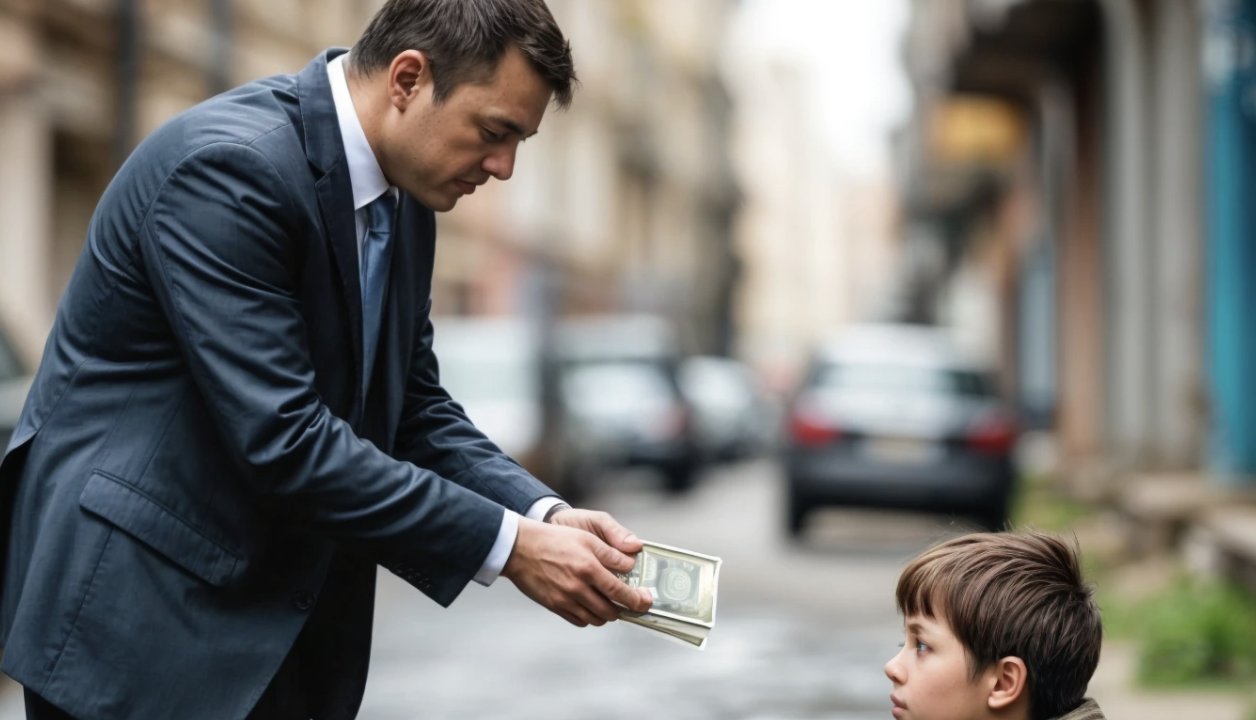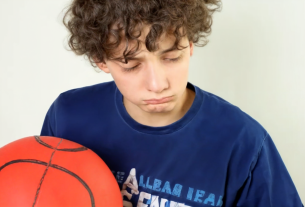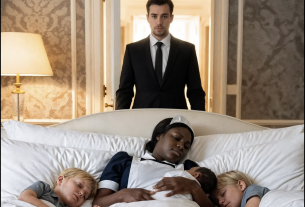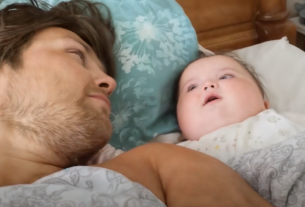The darkness that lives in a house doesn’t always hide behind tightly drawn curtains. Sometimes it’s in trembling hands, in a face twisted with rage, in a smell that seeps into the walls, the furniture, the skin.
The hand that shot up into the air like lightning before a storm didn’t catch Mark off guard. He no longer flinched. He only recoiled as if from a burn—mechanically, out of habit. It wasn’t the first time. And most likely not the last. His father, Sergey, stood before him, staggering like a drunken tree in the wind. His eyes, cloudy and empty, did not see his son. They saw only his own pain, his own powerless fury, which he unleashed on everything within reach. And the smell? The smell was disgusting—a mix of cheap moonshine, unwashed clothes, and bitterness that seemed to have soaked into every corner of their tiny, suffocating apartment.
“Get out of my sight, you little bastard!” Sergey rasped, his voice breaking like shattered glass.
From the kitchen came hoarse, hysterical sobbing—his mother, Tamara. Her tears had long been the habitual soundtrack of this house. Once, Mark had tried to comfort her. Then he realized: tears are not pain, but a habit. Like drinking. Like yelling. Like the eternal, suffocating silence between fights.
He slipped out the door without even reaching for the handle—it was left open, like a symbol of their broken family. Behind him, already on the stairs, someone’s heavy body crashed to the floor, a piercing scream rang out, but Mark only clenched his fists and quickened his pace. He didn’t look back. Because every time he looked back—nothing changed.
The morning was not just gray. It was dead. The sky, covered with leaden clouds, pressed on his soul like a vise. The courtyard well, surrounded by peeling five-story buildings with their flaking walls and broken entrance doors, seemed not a neighborhood, but a trap. A concrete and despair snare.
Parents? Mother—at the warehouse, in the cold, under the roar of forklifts, with hands trembling from exhaustion. Father—at the bus depot, a watchman who cared more about his bottle than other people’s vehicles. Both worked to survive. Or rather, to not die of hunger. But the money was enough only for bread, potatoes, and… a bottle. Always—a bottle.
Conflicts were their language of communication. Yelling, hitting, broken furniture. Mark hardly remembered any sober days. He remembered how his mother tried to protect him. Remembered how his father beat her through him. Remembered how once, at seven years old, he had shielded her from a blow.
He sat down on a bench. Stone cold, like the heart of this world. The wind pierced his thin jacket as if trying to steal the warmth from his body. He hugged his knees, trying to warm himself. Hunger twisted his stomach into a knot. Yesterday’s dinner? A piece of stale bread stolen from under his father’s nose while he argued with his mother.
Mark looked up at the sky. The sun was trying to break through the clouds like a weak ray of hope. He checked the time. It was time.
Time to go to the café “Lemon and Mint.”
There, where other people live. Those who wear clean clothes, laugh loudly, eat hot food, drink coffee with a vanilla aroma. Those who might drop a coin. Or, miracle of miracles, bring out a half-eaten sandwich.
To ask? Asking is not shameful. Shame is a luxury. A luxury only those with a choice can afford. Mark had no choice. He had only one law: survive.
And on the street, people survived like this: some stole, some hid, some begged. He begged. But not God. God had long since turned away from those like him. He begged people—their mercy, their humanity.
At thirteen, Mark already understood: the world is a cold machine. It doesn’t care about the weak. Doesn’t pity. Doesn’t look in the eyes.
But… sometimes—very rarely—a miracle happened.
Not loud. Not bright. Just human.
Six months ago, he lay on the asphalt, clutching his busted lip. Teenagers, older and stronger, had ripped the coins from him—all he had collected all day. Blood ran down his chin. The world spun. He thought, “That’s it. Now I’ll just die here, on this curb, and no one will notice.”
And suddenly—a quiet sound of an expensive car.
It stopped. The door opened. A man got out. Not in uniform, no police baton. Just—a human. He didn’t ask what happened. Didn’t say, “You brought it on yourself.” He just held out his hand. And in Mark’s palm lay a large bill.
For a second the boy didn’t believe it. He looked at the money as if it were a dream.
The man nodded. And left.
That was Alexey Vitalyevich. Although Mark didn’t know his name then.
That act—without words, without conditions, without regret—etched itself into memory like a star in the night sky. The money burned up in a day: bread, warm tea, bandages for the wound. But the warmth—the warmth from that gesture—remained. It warmed more than any fire.
Since then, Mark began noticing that car—with the bright green stripe. Every time it appeared near “Lemon and Mint,” he hid.
Not out of fear.
Out of respect.
He didn’t want that man to think: “Ah, him again. Came to beg.” Mark didn’t want to turn kindness into a habit. Into a debt. Into an obligation.
For him, that moment became sacred. Like light in a tunnel. Like proof that people can be kind.
And now—again.
This gray and dull morning suddenly lit up.
The green stripe. The familiar car.
Mark froze. His heart pounded like a hammer. He instinctively darted behind a corner, hid in the shadows, but didn’t take his eyes off it.
Out of the car stepped he.
Alexey Vitalyevich.
He entered the café, sat at his favorite table by the window. His face was tense, as if bearing a burden that no one but himself could see.
At home awaited his own tragedy.
A quarrel with his daughter, Natasha. He thought she asked too much. Weekends out of town? With friends? Madness! What if an accident? What if they get her drunk? What if she disappears, like Marina—his wife, his love, his past?
“Dad, I’m eighteen! I’m not a child!” she yelled.
And he heard only: “Don’t lose her. Don’t let it happen. Don’t repeat the mistake.”
After Marina died five years ago, he became a shadow. A warden. A jailer of his own daughter.
Psychologist Olga Igorevna told him bluntly:
“You control her because you can’t control your own pain.”
It was like a knife blow. And true.
Two men approached his table. Brothers Gleb and Vadim. Smiles like masks. Eyes like snakes.
They had already tried to deceive him. Inflated estimates. But Alexey wasn’t a fool. His lawyers checked everything.
“The conditions are mine. And they are not up for discussion,” he said, throwing a folder on the table.
Gleb and Vadim glanced at each other. Smiles vanished.
Breakfast began in tense silence. The waiter brought an omelet with mushrooms. Alexey raised the fork to his mouth…
And suddenly—a voice.
Quiet. Trembling. But clear.
“Don’t eat that.”
Everyone turned. By the table stood a boy. Dirty. Thin. In a torn jacket.
“I heard them talking… They put something in your food.”
Gleb paled. Vadim jumped up, ready to grab the boy by the collar.
But Alexey raised his hand.
“Wait.”
He looked at Mark. In his eyes—no lie. Fear. And truth.
Then at Gleb.
“Interesting… What if we check?”
He abruptly stood, took his plate and switched it with Gleb’s.
“Help yourself, Gleb. Since you tried so hard.”
Gleb recoiled like from a snake.
“What are you doing?!” hissed Vadim. “You said everything’s clean!”
“I… I didn’t think this…” stammered Gleb.
And everything became clear.
Attempted poisoning. The last desperate step after the scam failed.
The administrator, Eduard, was already calling the police.
Alexey slowly stood up. Walked to the boy.
“Thank you, kid.”
He spoke quietly. But every word carried weight.
“You saved my life. Come with me. You need to eat. Real food. Meet my daughter.”
Mark froze for a moment, as if time stopped.
Doubts whirled in his head, cold as winter wind: “What if it’s a trap? What if he changed his mind? What if it’s a joke, a test, a trial of strength?”
He was used to kindness always having a price. That everything is paid for—with tears, pain, humiliation.
But then he remembered.
Remembered the emptiness in the apartment, where every item screamed ruin. Remembered the smell of booze soaked into wallpaper, pillow, skin. Remembered his mother’s screams, no longer begging for help—they just existed as a background of horror. Remembered how once, at three in the morning, he sat on the floor hugging his knees, thinking: “If I die now—no one will know. No one will notice. No one will come.”
No one waited for him there. Neither sober nor drunk. Neither alive nor dead.
But here…
Here someone said: “You saved my life.”
Here someone looked him in the eyes—not down from above, not with pity, but with respect.
Here someone held out a hand.
“Okay,” he whispered.
And that whisper was not just an agreement.
It was the first step into a new life.
The door swung open—and Mark found himself in another world.
A spacious apartment flooded with light, smelling of lavender and fresh bread, seemed like a dream. Walls—clean, white. Floor—shiny. Curtains on the windows, not rags covering cracks.
A girl came out of the kitchen. Tall, with warm brown eyes and hair like autumn leaves. Natasha.
She froze, looking at him—the boy in the torn jacket, with dirty cheeks and a gaze full of fear.
“Dad, and this is… who?” she asked, and there was no contempt in her voice. Only surprise.
“This is Mark,” Alexey replied, and something new sounded in his voice. Something warm. Almost proud. “He saved my life today. Please feed him. He’s very hungry.”
The words hung in the air.
And at that moment everything changed.
Natasha didn’t ask extra questions. Didn’t look askance. Didn’t turn up her nose. She simply nodded—and rushed to the kitchen as if saving lives was a usual thing for her.
“Of course! I’ll make something now!” she shouted. “Sit down, Mark! Don’t be shy! And you can wash your hands here,” she pointed to the bathroom door.
He went there as if entering a temple.
Mirror. Clean towel. Soap with a mint scent. Water—warm, scalding. He looked at his hands, scratched and dirty, and for the first time in a long time felt like a human.
At the table he sat like on needles. Afraid to move. Afraid to dirty the tablecloth. Afraid to hold the fork wrong. Every gesture seemed suspicious, foreign, not his own.
But Natasha didn’t laugh.
She placed before him a plate with scrambled eggs, bacon, fresh vegetables. The smell was otherworldly.
“Eat,” she said softly. “You deserve it.”
While the food sizzled on the stove, she brought a large book—worn but with bright illustrations.
“Do you like fairy tales?” she asked.
Mark shook his head. Books were foreign to him. In his world, there was no place for fairy tales. Only reality, cold and hunger.
But Natasha didn’t give up.
She opened a page and began to read. Her voice was like music—warm, smooth, like a stream.
She read about a brave knight who walked through a storm to save a princess. About a dragon who was just lonely. About a sword that was strong not because it was sharp, but because it held the fire of faith.
Mark listened. At first with distrust. Then with his heart skipping.
For the first time in many years, something stirred in his soul.
Not hope. Not yet.
But possibility.
At dinner the conversation flowed easily. About the weather. About movies. About Natasha’s school days. They didn’t pry into his past. Didn’t dig into wounds. Didn’t demand explanations.
They accepted him.
Just like that. Without conditions.
Mark hardly spoke. But he listened. And felt the lump in his throat slowly dissolve. The ice inside melt. The feeling that he was nobody disappear.
For the first time in many years, he didn’t feel alone.
The next morning Alexey showed him around the apartment. Stopped at the guest room door.
“This is your room now,” he said, putting a key into Mark’s palm.
A key. Cold. Heavy. Real.
Mark looked at it like a miracle.
Alexey placed a bag on the bed. Inside—new clothes. Clean. Fresh. And a school uniform.
“This is for a new life,” he said. “If you’re ready.”
Mark didn’t answer. He just squeezed the key tight.
And nodded.
The hardest part began.
Not hunger. Not cold.
Getting used to being human.
Routine. Schedule. Lessons. Rules. Washing every morning. Eating on time. Saying “thank you.” Listening. Learning.
The first weeks were a struggle. Mark woke from nightmares. Slipped into the bathroom to check if the food was still there. Feared he’d be kicked out if he didn’t live up to the trust.
But Natasha was near.
Every evening she sat with him at the table. Taught him to read. Explained tasks. Didn’t scold when he made mistakes. Laughed when he joked.
“You’re smart, Mark,” she said. “Nobody just believed it before.”
Gradually he began to understand.
And then—he began to believe himself.
Teachers at the new school were surprised: a boy who didn’t know multiplication tables solved equations within a month. Within two—wrote essays.
Another person appeared in their house.
Ivan Sergeyevich—Natasha’s friend. Tall, strong, with eyes glowing calmness. A professional boxer.
He saw how Mark sat in the corner, closed off like a shell.
“Want to train?” he asked.
Mark shook his head.
“Too bad,” Ivan smiled. “Boxing isn’t about punches. It’s about not falling. Even when the whole world is pressing.”
At first Mark went to training out of politeness.
Then—out of necessity.
Morning runs at dawn. Pull-ups in the yard. Push-ups. Talks about discipline. About strength of spirit. About how true strength is not in fists but in the mind.
Ivan became more than a mentor.
He became an older brother.
Alexey hadn’t forgotten Mark’s past.
He hired a delivery service. Every week—groceries for Tamara and Sergey. Bread, milk, vegetables.
But not a penny to them.
“We must not help them drown,” he told Mark. “We must give them a chance to survive. And then—their choice.”
Mark began visiting his parents.
Each time he came back quieter.
Because he saw: his real home was here.
After several months, long paperwork, court hearings, psychologist interviews, Alexey obtained guardianship.
Mark officially became his son.
They celebrated.
First New Year. First birthday. First “A.”
Movies. Walks. Trips out of town. Evenings by the fireplace with popcorn and old films.
From three people they became a family.
Not by blood.
By choice.
By love.
Years passed.
The restaurant hall shone. Crystal chandeliers, flowers, laughter, music.
Natasha stood in a white dress. Next to her—her husband, Ivan.
A wedding.
In the midst of the celebration, the host announced:
“A word for congratulations—to Mark!”
Everyone turned.
A young man stood from the table. Tall. Straight. In a strict suit. Eyes—calm. Confident.
He walked to the center of the hall. Holding a sheet of paper.
“I don’t know how to speak beautifully,” he began, and the hall grew quiet like a church. “So I wrote what I feel.”
He began to read.
The poem was simple. Without rhyme, without pomp. But every word hit like a blow to the heart.
About how he was alone.
About how the world was gray.
About how one gesture—one act—changed everything.
About family.
About a man who didn’t turn away.
About a sister who taught him to believe.
About a brother who showed him how to be strong.
And at the end—words addressed to Alexey:
“Thank you, Dad, that in a cold world
you became the fire that never went out.
Thank you that my sister gave me
hope, faith, and warmth right now.
You didn’t just give me a roof and food,
You gave me the right to be myself.
And though my path was hard and tough—
I became happy—and not alone.”
Silence.
Then applause. Tears.
Alexey sat, unable to speak.
He looked at Natasha—his daughter, now a woman.
At Ivan—a worthy man who loves her.
At Mark—his son.
He felt pride.
Not for achievements.
Not for talents.
For the fact that they were together.
For the fact that they were family.
He understood: his fear of losing his daughter was gone.
Because family is not lost.
It grows.
He no longer feared.
He was proud.
He loved.
And at that moment he realized:
He was not just saved—he saved.
And in that—his new life.



